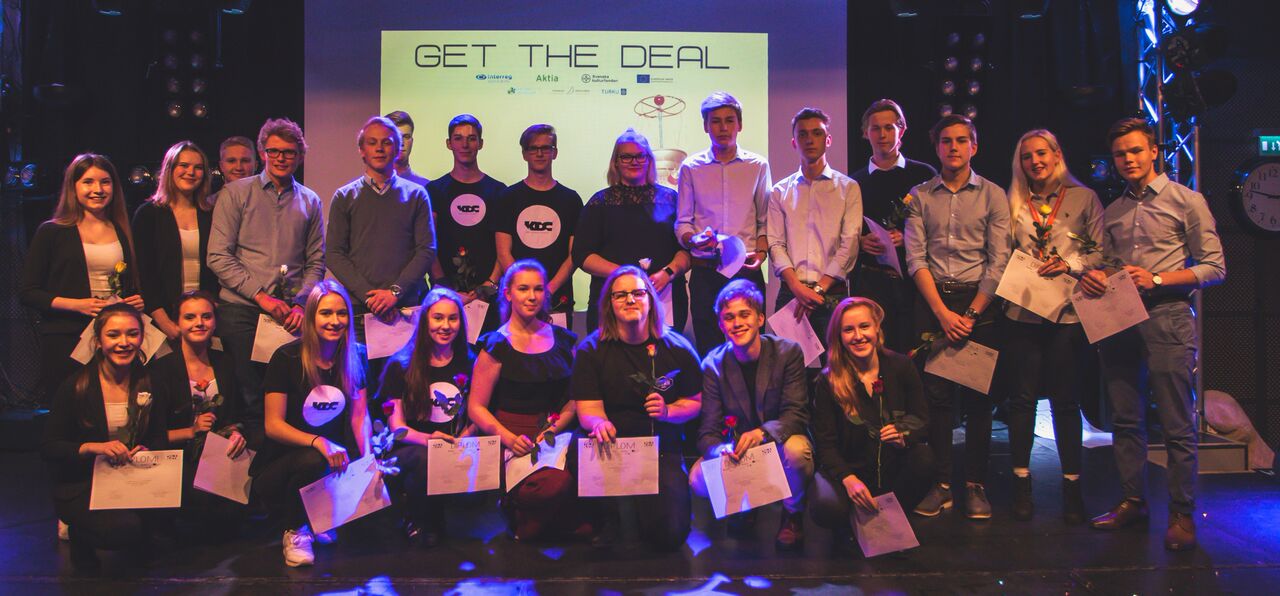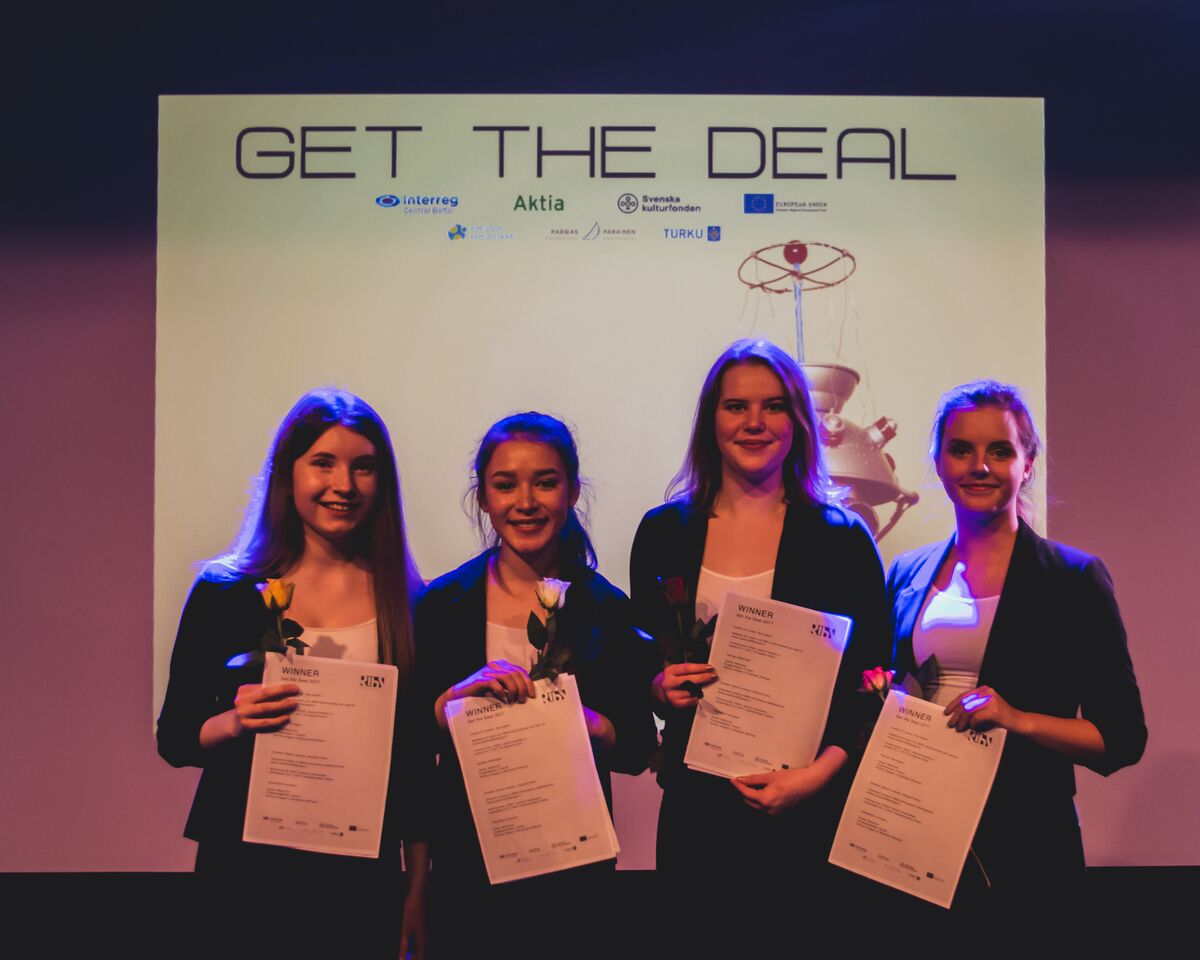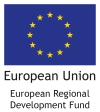Enthusiasm, ideas and business culture at RIBS’s Get the deal competition
As a newcomer, I think that there’s no better way to discover the Central Baltic programme and its area than to meet its projects. Meeting people who have directly benefitted from cross-border cooperation enables me to recognize the concrete outcomes of territorial cooperation: concretely getting closer to projects, as I did attending RIBS project’s Get the deal event in Turku, added value to my job as an IVY volunteer.
Project RIBS – which is based in Sweden, Åland, Finland and Estonia – works with youngsters from archipelago and rural areas on empowering their entrepreneurial attitudes: the Get the deal competition was set up in this framework.
The event took place in Turku between 27-30 October and was a business competition among six teams formed by students from different high schools: Katedralskolan i Åbo, Kimitoöns gymnasium, Paraisten lukio, Pargas svenska gymnasium, Åbo Yrkesinstitut from Finland and St. Eriks gymnasium from Sweden. Each team collaborated with a company (there was a huge variety, considering that it was possible to find tech companies such as Partel and Hibox alongside the town administration of Kimitoön, then Fabrik 1686, situated in Taalintehdas, the Kashmi Dance Company and the Turku-based toy shop Casagrande) in order to find a business solution suitable for their case. The students’ teams worked closely with the companies, who provided them with a challenge to tackle. During the weekend, the teams had the possibility to get to know the company they were linked to better, in order to come up with a solution that would better fit their challenge before presenting it to the competition’s jury on Monday 30 October.
“It’s easy to find companies which want to collaborate with Get the deal” told me RIBS’s project leader for Finland Oliwer Bäcklund “we have a wide range of companies who worked with us and are really pleased with the results, so we can just make reference to them”.
Get the deal 2017 was in fact the latest of a series of competitions, organized by project RIBS. The business game stemmed from the Pargas gymnasium’s principal idea of. At first it was a part of a business administration course taught in the school. Later on the idea was up scaled thanks to the involvement of project RIBS.
The most notable feature of the Get the deal’s upscaling is the cross-border element. In Turku, the competition brought together 23 high-school students from different parts of the project’s area. Furthermore “we had also people who visited the competition to get to know the concept, such as high-school professors from Sweden”, confirmed Finland’s project leader.

Get the deal's young participants (photo: Filip Lundsten/Meaningless Productions)
In the past years, especially since the idea evolved into a project financed by the Central Baltic programme, Get the deal has gained popularity and visibility- it became something for which “students wait for the entire year: everyone wants to be part of the competition”, said Oliwer Bäcklund, “schools have to handpick students, because they can send only 4 students per school”.
The students who made it to the competition were actively involved: first they elaborated a business solutions and then they presented their outcomes on the venue’s stage. Considering the young age of the contestants, I was impressed by how much effort they put into their works and how much they were at ease while explaining the solutions they came up.
The winning team, selected by a jury, consisted of Tilda Kuvaja, Sara Rosenqvist, Mimi Sy and Lotta Robertsson from the Paraisten lukio, and won with a business solution that would increase the use of Hibox video services among 15-25 year-old youngsters.
“We are very surprised by our result” declared the team, who participated in Get the deal after their teacher asked students if they were interested. “We thought it would be a good experience” “it was really nice and fun to work with the group!”. It seems like the winners were all very satisfied with their experience.
It was the first time they took part in the competition, but RIBS and Get the deal were not something new to them, as they all agreed that the project and its activities are very popular in the Turku archipelago area, in which they live and study. In addition, they said that through their participation they discovered more about the Central Baltic programme.

The team from Paraisten lukio, which won the competition
(photo: Filip Lundsten/Meaningless Productions)
Beside the impression of the enthusiasm and the dedication of all the students involved, I got to know that Get the deal achieved concrete outcomes in the development of entrepreneurial attitudes. In many cases the plans provided by the young contestants were so much appreciated by the companies that they decided to hire the students for a summer job or an internship.
“That’s the goal” explained project leader for Finland “we don’t demand it, but we encourage the companies to keep in touch with the students after the competition if they think they have worked very well. This year for example all the companies remained in touch with the students also after the event”.
The collaboration with the companies is not the only achievement participants can reach, first of all with Get the deal’s experience they have a remarkable opportunity to learn. According to Oliwer Bäcklund, project leader for Finland, “knowledge” is a central idea in the competition. “Students can learn for example how to deal with a company, how to do market research/analysis.
RIBS is doing a remarkable work. In connecting students to the business field. The project is conveying youngsters’ fresh ideas into real opportunities for their future. All the students involved in the event that took place in Turku were willing to work and to create something worthy from their own ideas.
And while the event in Turku was attended mainly by Swedish-speaking students, a bigger, even more international, competition is planned to happen in Stockholm next April.
Project RIBS – which is based in Sweden, Åland, Finland and Estonia – works with youngsters from archipelago and rural areas on empowering their entrepreneurial attitudes: the Get the deal competition was set up in this framework.
The event took place in Turku between 27-30 October and was a business competition among six teams formed by students from different high schools: Katedralskolan i Åbo, Kimitoöns gymnasium, Paraisten lukio, Pargas svenska gymnasium, Åbo Yrkesinstitut from Finland and St. Eriks gymnasium from Sweden. Each team collaborated with a company (there was a huge variety, considering that it was possible to find tech companies such as Partel and Hibox alongside the town administration of Kimitoön, then Fabrik 1686, situated in Taalintehdas, the Kashmi Dance Company and the Turku-based toy shop Casagrande) in order to find a business solution suitable for their case. The students’ teams worked closely with the companies, who provided them with a challenge to tackle. During the weekend, the teams had the possibility to get to know the company they were linked to better, in order to come up with a solution that would better fit their challenge before presenting it to the competition’s jury on Monday 30 October.
“It’s easy to find companies which want to collaborate with Get the deal” told me RIBS’s project leader for Finland Oliwer Bäcklund “we have a wide range of companies who worked with us and are really pleased with the results, so we can just make reference to them”.
Get the deal 2017 was in fact the latest of a series of competitions, organized by project RIBS. The business game stemmed from the Pargas gymnasium’s principal idea of. At first it was a part of a business administration course taught in the school. Later on the idea was up scaled thanks to the involvement of project RIBS.
The most notable feature of the Get the deal’s upscaling is the cross-border element. In Turku, the competition brought together 23 high-school students from different parts of the project’s area. Furthermore “we had also people who visited the competition to get to know the concept, such as high-school professors from Sweden”, confirmed Finland’s project leader.

Get the deal's young participants (photo: Filip Lundsten/Meaningless Productions)
In the past years, especially since the idea evolved into a project financed by the Central Baltic programme, Get the deal has gained popularity and visibility- it became something for which “students wait for the entire year: everyone wants to be part of the competition”, said Oliwer Bäcklund, “schools have to handpick students, because they can send only 4 students per school”.
The students who made it to the competition were actively involved: first they elaborated a business solutions and then they presented their outcomes on the venue’s stage. Considering the young age of the contestants, I was impressed by how much effort they put into their works and how much they were at ease while explaining the solutions they came up.
The winning team, selected by a jury, consisted of Tilda Kuvaja, Sara Rosenqvist, Mimi Sy and Lotta Robertsson from the Paraisten lukio, and won with a business solution that would increase the use of Hibox video services among 15-25 year-old youngsters.
“We are very surprised by our result” declared the team, who participated in Get the deal after their teacher asked students if they were interested. “We thought it would be a good experience” “it was really nice and fun to work with the group!”. It seems like the winners were all very satisfied with their experience.
It was the first time they took part in the competition, but RIBS and Get the deal were not something new to them, as they all agreed that the project and its activities are very popular in the Turku archipelago area, in which they live and study. In addition, they said that through their participation they discovered more about the Central Baltic programme.

The team from Paraisten lukio, which won the competition
(photo: Filip Lundsten/Meaningless Productions)
Beside the impression of the enthusiasm and the dedication of all the students involved, I got to know that Get the deal achieved concrete outcomes in the development of entrepreneurial attitudes. In many cases the plans provided by the young contestants were so much appreciated by the companies that they decided to hire the students for a summer job or an internship.
“That’s the goal” explained project leader for Finland “we don’t demand it, but we encourage the companies to keep in touch with the students after the competition if they think they have worked very well. This year for example all the companies remained in touch with the students also after the event”.
The collaboration with the companies is not the only achievement participants can reach, first of all with Get the deal’s experience they have a remarkable opportunity to learn. According to Oliwer Bäcklund, project leader for Finland, “knowledge” is a central idea in the competition. “Students can learn for example how to deal with a company, how to do market research/analysis.
RIBS is doing a remarkable work. In connecting students to the business field. The project is conveying youngsters’ fresh ideas into real opportunities for their future. All the students involved in the event that took place in Turku were willing to work and to create something worthy from their own ideas.
And while the event in Turku was attended mainly by Swedish-speaking students, a bigger, even more international, competition is planned to happen in Stockholm next April.


